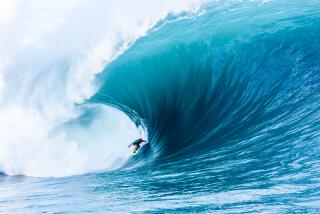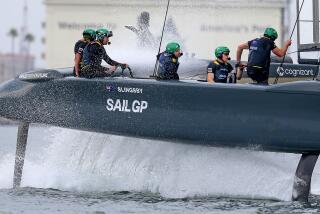Congressional Cup : Gilmour, Prince of Protests, Will Encounter a New System
- Share via
Crash Gilmour, they called him, the intimidating helmsman of Fremantle.
The America’s Cup credo of Australia’s Kookaburra sailors was to win any way you can, on the water or at the protest hearing. Peter Gilmour, the alternate helmsman to skipper Iain Murray, perhaps pursued it to a fault. The Kookaburras filed more protests than anyone.
So now, at 27 and a year wiser, here comes Gilmour as the favorite to win the 24th Congressional Cup match racing series starting at Long Beach Wednesday, but the organizers are ready for the aggressive Aussie.
No more protest hearings. For the first time in a World Cup match racing event, all disputes will be settled by judges on the water during the races, like a judgment call in any other sport.
When a competitor pops his protest flag--yellow for this event--two judges following in a small rubber boat will either wave the “safe” sign, indicating no foul, or signal the guilty party to drop his headsail momentarily--essentially, a penalty of two or three boat lengths on the spot instead of a possible disqualification that night.
Rivals admit they are wary of Gilmour in a race, but is Gilmour the intimidator going to be intimidated by two judges following in his wake, watching his every move?
“I’ll sail with the same aggression I’ve always had,” Gilmour said Sunday. “The advent of on-the-water judging is really progressive. I think it’s a great idea.”
His rivals believe he’s a good enough sailor to win without causing problems. Gilmour has swept the first three of eight qualifying events leading to the World Cup of Match Racing at Long Beach in August.
Eddie Owen of Wales, the Congressional’s defending champion, said: “We had a couple incidents last year. It got to a stage where I thought he wasn’t doing his reputation any good.
“We had a discussion about it, and I think his attitude’s changed a little bit. He knows he can win on skill, and he’s certainly a much more mature sailor the last six months over what he was a year ago.”
Peter Isler, who as Dennis Conner’s navigator on Stars & Stripes opposed Gilmour in the America’s Cup final, disagreed.
“In the Nippon Cup he seemed to be less protest prone,” Isler said. “But up to then he had the highest percentage of protests. He hasn’t changed his style.”
Nor does Gilmour hope to live down his reputation.
“Oh, no, we’re trying to live it up ,” he said, happily. “We brought to the fore what match racing really is: An intense coming together of yachts to gain one result.
“It isn’t as in (fleet) racing: The fastest around the course that keeps out of mischief. It’s more just get around the course in front of the other guy. If you can muck him up as much as you can or he can muck you up, that’s what people are trying to do.”
All 10 of the Congressional entrants welcome on-the-water judging.
Owen said: “It will have problems, I’m sure, in the early stages, but I think it’s the way to go. The America’s Cup last time around showed the great spectacle you have on the water can be spoiled by the result not being decided until the early hours of the following morning.”
John Bertrand, the Olympic Finn silver medalist who was Tom Blackaller’s tactician aboard USA at Fremantle, said: “The sport encourages aggressive, close-quarters racing. You could get some calls against you, but you can go right on from there.”
Chief judge Tom Ehman, a Sail America executive, called the system “the wave of the future” and cautioned that anyone who calls too many frivolous protests will be disqualified, because the judges now can judge for themselves.
Ehman will supervise six pairs of top international judges--one of whom happens to be Britain’s Bryan Willis, the former rules adviser to the Kookaburra syndicate which prepared and argued all of Gilmour’s protests at Fremantle.
“Spending so much time with Bryan, he really showed us the intricacies of the rules and how to apply them,” Gilmour said. “That’s what we did during the America’s Cup--took it as far as we possibly could.”
More to Read
Go beyond the scoreboard
Get the latest on L.A.'s teams in the daily Sports Report newsletter.
You may occasionally receive promotional content from the Los Angeles Times.










